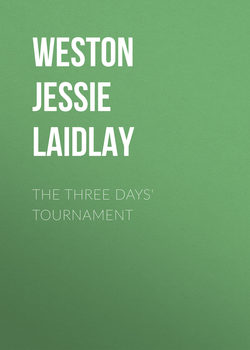The Three Days' Tournament

Реклама. ООО «ЛитРес», ИНН: 7719571260.
Оглавление
Weston Jessie Laidlay. The Three Days' Tournament
PREFACE
THE EVIDENCE OF THE IPOMEDON
CLIGÉS
THE FOLK-TALE
THE ROMANCE
THE BEARING ON THE LANCELOT STORY
EVIDENCE FOR AN INSULAR VERSION OF THE ROMANCE
Отрывок из книги
These words of the author of the Ipomedon were, some years ago, commented upon by Mr. Ward in his valuable Catalogue of Romances in the British Museum, vol. i. He there remarks that the allusion is especially valuable as being the direct ascription, by a contemporary, of the character of romance-writer to Walter Map, and that in apparent connection with the romance most persistently attributed to him—the Prose Lancelot.
The suggestive remarks of Mr. Ward do not appear hitherto to have attracted the attention they deserve. Recently, having occasion to write a brief notice of Walter Map, they came, for the first time, under my notice, and, taken in connection with certain points of the Lancelot study in which I had for some time been engaged, assumed an unexpected importance. It became evident to me that the whole question of the connection of the Ipomedon with Arthurian literature, and the light which the words of the author might throw upon the relation to each other of different forms of the same story, was well worth study; and might eventually be of material assistance in determining the much debated question of the position of Chrétien de Troyes in the Arthurian cycle.
.....
As is well known, the question as to the share which may rightly be assigned to Walter Map in the evolution of the Arthurian legend is one of the problems of modern criticism. At one time or another, with the exception of the Merlin and the Tristan, all the great prose romances of the cycle, the Lancelot, in its completed form, the Grand S. Graal, Queste, and Mort Artur, have been assigned to him,10 and till quite recently writers on early English literature did not scruple to accept the tradition. Probably even to-day the majority would name Walter Map as the populariser, if not the inventor, of the Grail legend. Those, however, who are familiar at first hand with the romances in question have long since realised that in their present form they represent the result of a long period of accretion, and have undergone many redactions; they cannot possibly, as they now stand, be held to be the work of any one writer, certainly not of one who took so active and leading a part in public affairs as did Map. Further, his own statement, in the famous words recorded by Giraldus Cambrensis, to whom they were addressed, ‘Multa scripsistis et multum adhuc scribitis et nos multa diximus. Vos scripta dedistis et nos verba,’ with the application that follows, have been held by Professor Birch-Hirschfeld and other scholars to be a direct denial on his part of any literary activity.11 At the same time we know Map did write, and was interested in romantic and popular tales, further that he had the reputation of being a poet,12 and the persistence of the tradition connecting him with the Arthurian cycle can hardly be set aside. The question is, do these words of Hue de Rotelande throw any light upon this disputed point? Can we hope by the aid of this contemporary of Map’s to arrive at a conclusion which may assist us in determining the real nature of his contribution to the development of this famous cycle, and will the ascertaining of this fact help us, as the definite establishment of a single fact often does, to solve other problems closely connected therewith? Mr. Ward, when he wrote the article to which I have referred above, expressed a decided opinion on this point; and it appears to me that by following up the lines of research there indicated we shall attain results far more important in themselves, and far more startling in their ultimate effect than he then suspected.
First, let us see exactly what Hue says. The passage in question (which will not be found in the translations) occurs at the end of the first portion of the poem. The author has just been relating how his hero, who is living at King Meleager’s court, in the assumed character of body-servant to the queen, scouts the idea of attending the tournament which is to decide who shall wed La Fière of Calabria, loudly expressing his preference for the pleasures of the chase. Each morning he leaves the court before daylight, announcing his departure by loud blasts of the horn; but having reached the forest, where his servant awaits him with steed and armour, he sends his ‘Master,’ Tholomy, to hunt in his stead; and arming himself each day in a different suit of armour, white, red, and black, proceeds to the tournament, where he carries off the prize for valour, unhorsing all the principal knights on either side, even to the king himself, and his valiant nephew Cabaneus. Each evening he returns to the forest, reassumes his hunter’s garb, and with the spoils of the chase won by Tholomy takes his way to the court, where he vaunts the skill of his hounds above that of the unknown knight, and is roundly mocked for his lack of prowess by the ladies. After the third day he leaves secretly, to return to his own land, sending to the king, by the hand of a messenger, the spoils of his three days’ victory. The seneschal, Cananeus, volunteers to bring him back, and is punished for his officious interference, as related above.13 At the conclusion of this episode, Hue states that he is not lying—at least not more than a little—and if he be ‘’tis but the custom of the day, and all the blame should not be laid upon him, Walter Map is just as bad.’
.....